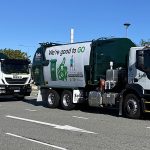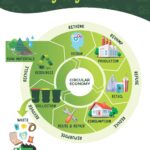Solo Invests in the Future: Company Expands Fleet with Hydrogen Vehicles
In a move that signals a commitment to exploring alternative fuel options, Solo Resource Recovery, a company well-known for its innovation in waste management services, has recently entered into an agreement to acquire two hydrogen powered vehicles. This agreement highlights Solo’s ongoing investment in sustainable transportation solutions and paves the way for exciting developments in the company’s future.
The agreement has been made in conjunction with Pure Hydrogen, who specialise in clean energy solutions, and it includes two hydrogen fuel cell (HFC) powered vehicles: one that is rear-loading and one with a side loader. The newly obtained vehicles will be deployed in Adelaide and Northern New South Wales, Australia.
The HFC trucks emit zero CO2 emissions, and with Solo currently servicing more than 1.2 million bins each week across Australia, their quieter operation can lead to less disruption to communities.
How Hydrogen Fuel Cells Drive Heavy Vehicles
As we shift towards a cleaner future, new technologies are emerging, and one of the most promising in the field of transportation is hydrogen fuel cell powered vehicles.
Here is how HFC technology works in heavy vehicles:
- Fuel Source: Unlike traditional combustion engines that burn diesel, hydrogen vehicles utilise hydrogen gas stored in onboard tanks.
- The Power Plant: The heart of the system is the fuel cell stack. This stack contains numerous individual fuel cells, each generating power through a clean chemical reaction.
- The Reaction: Hydrogen gas flows into one side of the fuel cell, while oxygen from the air enters the other. Inside, a chemical reaction separates hydrogen atoms, creating electricity.
- Clean Power: The only by-product of this process is water vapor, making it a zero-emission solution.
- Refuelling: Hydrogen vehicles refuel at dedicated stations, similar to petrol stations. The process is fast, taking around 3-5 minutes, comparable to filling a conventional diesel tank.
The Benefits for Heavy Transport
Hydrogen technology offers several advantages for heavy vehicles:
- Range: Unlike battery-powered alternatives, hydrogen vehicles can achieve long ranges, making them suitable for long range/route operations.
- Payload Capacity: Hydrogen storage tanks are lighter than large battery packs, allowing for increased cargo capacity.
- Fast Refuelling: Refuelling times are significantly faster than lengthy charging processes, minimising downtime.
- Quiet Operation: Hydrogen vehicles operate much quieter than diesel trucks, reducing noise pollution in communities.
The Road Ahead
While hydrogen technology is still under development, the potential for cleaner and quieter heavy transport is undeniable. Challenges like cost and limited refuelling infrastructure remain, however, with ongoing research and investment, hydrogen holds the promise to revolutionise the transportation sector, paving the way for a sustainable future on our roads. As always, Solo will continue to collaborate and invest in new waste management technologies as they emerge.
Related Posts

Published: October 1, 2024
Is Your Waste Management Performance Up to Scratch? Discover the Solo Difference
Read more
Published: December 15, 2023
The Right To Repair Movement Is Alive And Well In Mullumbimby!
Read more
Published: November 29, 2023